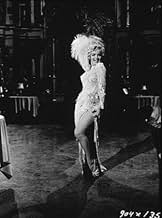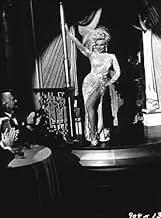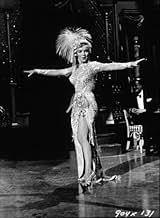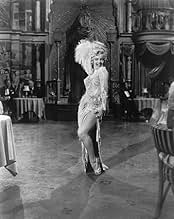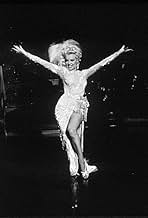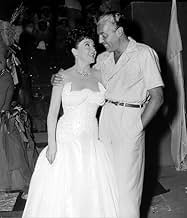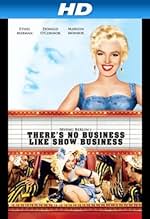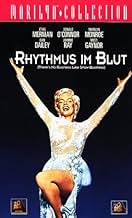NOTE IMDb
6,4/10
7,1 k
MA NOTE
Ajouter une intrigue dans votre langueA blonde beauty upsets a show business family.A blonde beauty upsets a show business family.A blonde beauty upsets a show business family.
- Réalisation
- Scénario
- Casting principal
- Nommé pour 3 Oscars
- 4 nominations au total
Dorothy Abbott
- Showgirl
- (non crédité)
Dorothy Adams
- Nurse
- (non crédité)
Robert Adler
- Night Watchman
- (non crédité)
Aladdin
- Orchestra Violinist
- (non crédité)
Fred Aldrich
- Private Detective
- (non crédité)
Avis à la une
"There's No Business Like Show Business" was never intended to be great film-making or storytelling, so please do not watch it with those things in mind.
Sure, it was over-staged, over-produced, in some cases over-acted and any other "overs" you can think of, but it's just fun to relax and watch and listen to. I've seen the film maybe dozens of times (I own the DVD) and it's obvious to me that despite a few on screen gaffes and off-screen problems for at least a couple of the actors, Hollywood had a whale of a good time making it. Some of the characters are unrealistic and I'm sure if you could ask the actors, all would say it was by far not their best work.
Furthermore, if we didn't know it before, "Show Business" proved that Johnnie Ray, the part crooner, part rock belter of the era, couldn't act his way into or out of a paper bag. But so what?? This ain't Hamlet. Ray was cast to do here what he did best: sing the heck out of a couple of songs that were arranged precisely to suit his performing style. And he also just managed to pull off an unusual plot twist that I'm sure audiences of the era did not expect.
We're all asked to suspend temporarily all logic and reason when we turn on our TVs or go to the movies. Why stop with "There's No Business Like Show Business"? So grab the munchies, sit back and let Ethel Merman and Gang entertain you for a couple of harmless, gaudy hours.
Sure, it was over-staged, over-produced, in some cases over-acted and any other "overs" you can think of, but it's just fun to relax and watch and listen to. I've seen the film maybe dozens of times (I own the DVD) and it's obvious to me that despite a few on screen gaffes and off-screen problems for at least a couple of the actors, Hollywood had a whale of a good time making it. Some of the characters are unrealistic and I'm sure if you could ask the actors, all would say it was by far not their best work.
Furthermore, if we didn't know it before, "Show Business" proved that Johnnie Ray, the part crooner, part rock belter of the era, couldn't act his way into or out of a paper bag. But so what?? This ain't Hamlet. Ray was cast to do here what he did best: sing the heck out of a couple of songs that were arranged precisely to suit his performing style. And he also just managed to pull off an unusual plot twist that I'm sure audiences of the era did not expect.
We're all asked to suspend temporarily all logic and reason when we turn on our TVs or go to the movies. Why stop with "There's No Business Like Show Business"? So grab the munchies, sit back and let Ethel Merman and Gang entertain you for a couple of harmless, gaudy hours.
The first time you watch this movie, you'll think it's long, boring, and stupid. The second time you watch this movie, you'll love it. I can't begin to tell you why, but it's the truth. (I had the chance to show this film to an audience during a Donald O'Connor film festival. People came up to me weeks later to say that they had caught it again on cable, and loved it the second time through.)
Marilyn is definately "ehh". This movie was filmed during her worst years of personal abuses, and it shows all over her face and her work, lending a shadowy sadness to her character for modern audiences. Donald O'Connor's character also takes on a new depth for modern viewers familiar with his own life's history, oftentimes with a sharp poignance that helps him grab control of so many scenes, and turn his character's story into the strongest sub-plot of the film.
Merman is BRILLIANT as the real head of this family, giving us a wonderfully unique character. Her role as the strong, smart, powerful, and loving mother is truly a standout for the 50's in general, and musicals in particular.
Marilyn is definately "ehh". This movie was filmed during her worst years of personal abuses, and it shows all over her face and her work, lending a shadowy sadness to her character for modern audiences. Donald O'Connor's character also takes on a new depth for modern viewers familiar with his own life's history, oftentimes with a sharp poignance that helps him grab control of so many scenes, and turn his character's story into the strongest sub-plot of the film.
Merman is BRILLIANT as the real head of this family, giving us a wonderfully unique character. Her role as the strong, smart, powerful, and loving mother is truly a standout for the 50's in general, and musicals in particular.
When Darryl F. Zanuck virtually forced exhibitors and most of his fellow studio mogul rivals to adopt CinemaScope as a panacea for TV's devastation of Hollywood's weekly box office bonanza, he dictated that virtually all of Twentieth's output was to be filmed in that eye-stretching process. "There's No Business Like Show Business," directed by that old pro, Walter Lang, seems to be the prime example of Darryl's minions saying to their boss: "You want wide? We'll give you W-I-D-E!!"
Everything about it was designed and lensed to emphasize the original ratio of the CinemaScope process and viewing it on a video that isn't letterboxed must look like what a one-eyed person must experience in everyday life. I never did see it in a theater but I have seen it on a TV broadcast which more-or-less recreated its widescreen ratio. It's a glorious mish-mash. Every Berlin tune that could be stuffed into it is given at least one run-through; John de Cuir's production design must have occupied every inch of several of Twentieth's West Los Angeles soundstages; Ethel Merman, after her terrific movie repeat of her Broadway success in "Call Me Madam" for Fox (and now, as of 2005, available on video), trumpets away in number after number (Must have been an ear-rending experience over those original four-track stereophonic sound systems.); Dan Dailey, Donald O'Connor and Mitzi Gaynor give it their energetic best; and then there's Marilyn. What can we say, with all that so sadly, in her personal life, came after she reluctantly fulfilled her contractual obligation in this one? She dazzles in, let's face it, a rather vulgar way, and seems shoehorned in to boost the potential box office. And they even added Johnnie Ray, a huge jukebox success at the time (and, due to his hearing deficiency, performing his songs at an even greater volume than La Merman.)
All in all this one shouldn't be missed if you want to view an example of Hollywood at its brassiest, in a production fairly bulging with elements that may not coalesce very harmoniously but which was, no doubt, worth the price of admission to those movie palaces before they were carved up to become the precursors of today's sterile multiplexes.
Everything about it was designed and lensed to emphasize the original ratio of the CinemaScope process and viewing it on a video that isn't letterboxed must look like what a one-eyed person must experience in everyday life. I never did see it in a theater but I have seen it on a TV broadcast which more-or-less recreated its widescreen ratio. It's a glorious mish-mash. Every Berlin tune that could be stuffed into it is given at least one run-through; John de Cuir's production design must have occupied every inch of several of Twentieth's West Los Angeles soundstages; Ethel Merman, after her terrific movie repeat of her Broadway success in "Call Me Madam" for Fox (and now, as of 2005, available on video), trumpets away in number after number (Must have been an ear-rending experience over those original four-track stereophonic sound systems.); Dan Dailey, Donald O'Connor and Mitzi Gaynor give it their energetic best; and then there's Marilyn. What can we say, with all that so sadly, in her personal life, came after she reluctantly fulfilled her contractual obligation in this one? She dazzles in, let's face it, a rather vulgar way, and seems shoehorned in to boost the potential box office. And they even added Johnnie Ray, a huge jukebox success at the time (and, due to his hearing deficiency, performing his songs at an even greater volume than La Merman.)
All in all this one shouldn't be missed if you want to view an example of Hollywood at its brassiest, in a production fairly bulging with elements that may not coalesce very harmoniously but which was, no doubt, worth the price of admission to those movie palaces before they were carved up to become the precursors of today's sterile multiplexes.
20th Century Fox was no match for MGM when it came to musicals. Daryl F. Zanuk decided to gamble with this film where the talents of a Broadway star, Ethel Merman, would be showcased. Ms. Merman in spite of being the toast of Broadway, never made it big in Hollywood. After all, she was not a radiant beauty, but oh, could she belt a song that could be heard at the top of the balcony! Phoebe and Henry Ephron were brought on board to write the screen treatment and Walter Lang directed.
The musical was also blessed in that Irving Berlin's music is heard throughout in all its glory. Ms. Merman was the perfect actress to interpret the songs written by Mr. Berlin. They made a perfect duo, even though, for some viewers not used to Ethel Merman's singing style, it might prove an uneasy combination.
The story is simple enough. It follows the Donahues from the early days of vaudeville through some glittering years after. Molly and Terence Donahue had two sons, Tim and Steve, and a daughter, Katy. As the children grow up, the parents' popularity began to recede. The film deals with Tim, as a young man, as he falls for Vicky Parker, a beautiful singer who makes it big on her own. Vickie, who is more interested in her own career neglects Tim. As a result, Tim goes on his own to find himself, away from his family and Vickie.
The best thing in the film is Ethel Merman. She was a legendary figure and as Molly Donahue, she is at her best. Dan Dailey was the perfect partner for Ms. Merman. Donald O'Connor is also seen doing some fine dancing. Marilyn Monroe was a lovely woman to look at. As a singer, she had a small voice, but she used it well making the songs her own. Mitzi Gaynor plays Katy. Johnnie Ray, a popular singer of that period is terribly miscast. His Steve is the worst thing in the movie.
Although predictable, this film has some great things going for it. Some of the musical numbers are well staged and will not disappoint. On the whole as the camaraderie expressed by the title of the film is evident in the musical.
The musical was also blessed in that Irving Berlin's music is heard throughout in all its glory. Ms. Merman was the perfect actress to interpret the songs written by Mr. Berlin. They made a perfect duo, even though, for some viewers not used to Ethel Merman's singing style, it might prove an uneasy combination.
The story is simple enough. It follows the Donahues from the early days of vaudeville through some glittering years after. Molly and Terence Donahue had two sons, Tim and Steve, and a daughter, Katy. As the children grow up, the parents' popularity began to recede. The film deals with Tim, as a young man, as he falls for Vicky Parker, a beautiful singer who makes it big on her own. Vickie, who is more interested in her own career neglects Tim. As a result, Tim goes on his own to find himself, away from his family and Vickie.
The best thing in the film is Ethel Merman. She was a legendary figure and as Molly Donahue, she is at her best. Dan Dailey was the perfect partner for Ms. Merman. Donald O'Connor is also seen doing some fine dancing. Marilyn Monroe was a lovely woman to look at. As a singer, she had a small voice, but she used it well making the songs her own. Mitzi Gaynor plays Katy. Johnnie Ray, a popular singer of that period is terribly miscast. His Steve is the worst thing in the movie.
Although predictable, this film has some great things going for it. Some of the musical numbers are well staged and will not disappoint. On the whole as the camaraderie expressed by the title of the film is evident in the musical.
This CinemaScope musical follows the lives and loves of the Donahues, a family of vaudeville performers: father Terrance (Dan Dailey), mother Molly (Ethel Merman), elder son Tim (Donald O'Connor), daughter Katy (Mitzi Gaynor), and younger son Steve (Johnnie Ray). They persevere through changing tastes, the stock market crash, and the start of WW2. Tim falls for co-star Vicky (Marilyn Monroe), while Katy finds romance with writer Charles (Hugh O'Brian), and Steve pursues a different calling.
The threadbare story merely serves to connect a series of elaborate musical numbers designed to make the best of the new widescreen CinemaScope format. Director Lang and choreographer Robert Alton turn in some excellent work, and Donald O'Connor reportedly called this his favorite of his films (over Singin' in the Rain?!?). I watched this for Monroe, who doesn't impress much here. She supposedly didn't want to appear in this, but did so in order to win the lead in The Seven Year Itch. This was one of Fox's most expensive productions to date, and despite selling a lot of tickets, it ended up being a money-loser. It earned Oscar nominations for (inexplicably) Best Story (Lamar Trotti), Best Score (Alfred & Lionel Newman), and Best Color Costumes (Charles Le Maire, Miles White, Travilla).
The threadbare story merely serves to connect a series of elaborate musical numbers designed to make the best of the new widescreen CinemaScope format. Director Lang and choreographer Robert Alton turn in some excellent work, and Donald O'Connor reportedly called this his favorite of his films (over Singin' in the Rain?!?). I watched this for Monroe, who doesn't impress much here. She supposedly didn't want to appear in this, but did so in order to win the lead in The Seven Year Itch. This was one of Fox's most expensive productions to date, and despite selling a lot of tickets, it ended up being a money-loser. It earned Oscar nominations for (inexplicably) Best Story (Lamar Trotti), Best Score (Alfred & Lionel Newman), and Best Color Costumes (Charles Le Maire, Miles White, Travilla).
Le saviez-vous
- AnecdotesOne day, Marilyn Monroe's husband, Joe DiMaggio, visited the set. He refused to be photographed with Monroe, but insisted on being photographed with Ethel Merman, whom he called "my favorite star."
- GaffesDonald O'Connor wears a gold ring on his left ring finger in almost all of his scenes. The ring is missing when he performs "A Man Chases a Girl (Until She Catches Him)", in the scene with Marilyn Monroe just before that, and in the film's climactic scenes.
Rings are not permanent fixtures, he simply removed the ring at some point and chose to no longer wear it.
- Citations
Molly Donahue: "Don't worry." Hmm. That's a laugh. You start worrying about your kids the day they're born and you never stop. Even after they bury you, I bet you never stop.
- ConnexionsFeatured in Marilyn (1963)
- Bandes originalesWhen the Midnight Choo-Choo Leaves for Alabam'
(uncredited)
Written by Irving Berlin
Performed by Ethel Merman and Dan Dailey
Later performed by Mitzi Gaynor and Donald O'Connor
Meilleurs choix
Connectez-vous pour évaluer et suivre la liste de favoris afin de recevoir des recommandations personnalisées
- How long is There's No Business Like Show Business?Alimenté par Alexa
Détails
- Date de sortie
- Pays d’origine
- Langues
- Aussi connu sous le nom de
- El mundo de la fantasía
- Lieux de tournage
- Société de production
- Voir plus de crédits d'entreprise sur IMDbPro
Box-office
- Montant brut mondial
- 6 341 $US
- Durée
- 1h 57min(117 min)
- Rapport de forme
- 2.55 : 1
Contribuer à cette page
Suggérer une modification ou ajouter du contenu manquant



